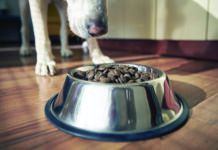Is Your Dog’s Food Bowl Bacteria-Free?
Measuring bacteria levels on 32 household surfaces, researchers have found that pet food dishes have the ninth highest level of contamination. The good news: taking the proper precautions can reduce bacterial counts by 90 to 99 percent. The main precautions:
“All Dogs Must Be Leashed” Applies to Yours, Too”
You know how certain state parks and nature reserves post signs telling dog walkers to keep their pets leashed, yet some people don’t? They may figure their dog is well behaved enough not to cause trouble, or they know the park is large enough that they can choose trails that keep them away from other people and other pets and thereby avoid behavior problems. But the dog should be leashed, anyway. The rules are not just about behavior toward people and other dogs.
Taking Your Dog’s Meds to Save Money on Prescriptions
The price of prescription drugs for people in the U.S. can be two to four times higher than in other industrialized countries, while the same drugs prescribed for dogs by veterinarians can sometimes be considerably less expensive. So should you take medicines meant for your pet to treat your own illness? Definitely not.
Twice-a-Day Feeding Not Enough for a Young Puppy
You might be used to feeding a dog twice a day, but if you bring home a very young puppy, she needs to be fed more often than that—ideally, about every four hours, or four times a day. When she reaches four months of age, you can switch to three times a day for several months, then to twice daily.
What’s a Clinical Exam?
Readers have asked us the difference between an exam and a clinical exam. A clinical exam is simply the doctor’s examination of a patient’s body (dog or human) in person, rather than, say, by phone or by looking over medical records. It’s the “show” part of a medical show-and-tell, and it’s a critical screening tool.
Why the Noise Phobia Seems Sudden—But Isn’t
Your perfectly healthy dog with no pain in his limbs or other parts of his body suddenly resists going for walks. It’s now an unhappy struggle every time you want to get him outside. What’s going on?
When You Turn Down the Thermostat Before Leaving the House But the Dog Stays...
Dogs, like people, can become uncomfortably cold in winter weather, even if they don’t show it. Thus, if you leave your dog home alone for several hours but turn down the thermostat to save on energy bills, make sure your pet has a fuzzy dog bed with a blanket. If she gets cold enough, she can even pull the blanket over herself with her teeth.
On Feeding Your Dog According to Package Directions
The label on a package of dog food will give a range of how much to feed depending on your pet’s weight. Many people should be feeding their dogs on the lower end of the range since a lot of today’s family pets are not getting much exercise to burn off the calories they eat. But if you find you need to feed your dog even less than the lower end of the recommended range for him to remain at a healthy weight, speak to your veterinarian about changing foods.
Easy on the Gravy
Thanksgiving week is one of the top three holiday weeks (along with Christmas and Easter) that dogs are taken to the emergency room. It’s because they develop a life-threatening disease called pancreatitis as a result of being fed too much in the way of fatty foods. In a misfiring, pancreatic enzymes start eating away at the pancreas itself, and potentially deadly inflammation of that organ ensues. Signs include a loss of appetite, nausea, sometimes unremitting periods of vomiting, a distended abdomen, and perhaps a fever.
What It Means If Your Dog’s Nose is Warm and Dry
A lot of people believe that a cool, moist nose is a sign of good health in a dog and a warm dry one means something’s wrong. But that’s not the case.
Shaking: When to Worry; When Not to
If your dog keeps shaking her head, take her to the vet. She could be afflicted with anything from an ear infection to a neurological issue. But if she does full-body shakeouts, there’s nothing to be concerned about. It’s just her way of regrouping or transitioning from one activity to another.
Repeated Exposure to Something Scary Won’t Help Your Dog Adjust
Your dog is scared to death of the vacuum cleaner, but you assume she’ll get over it once she has seen you use it a few times. She won’t. If your dog has a specific fear, the only way to help her get past it is to expose her gradually to whatever she’s afraid of. In the case of a vacuum cleaner, that might mean keeping it out in the open for a while and letting her sniff it when she wants to, then perhaps moving to vacuuming in a room that’s far from where she generally hangs out and keeping the door closed while you do so.
If your pet is afraid of other dogs, walk her where you’re not likely to see any—or at least very few, and at a distance. Arrange a short introduction with a sweet, gentle dog who doesn’t engage in any roughhousing. Throw your dog and the other one treats and speak in encouraging tones, removing your pet from the situation if she gets too upset. Then try again another day.















